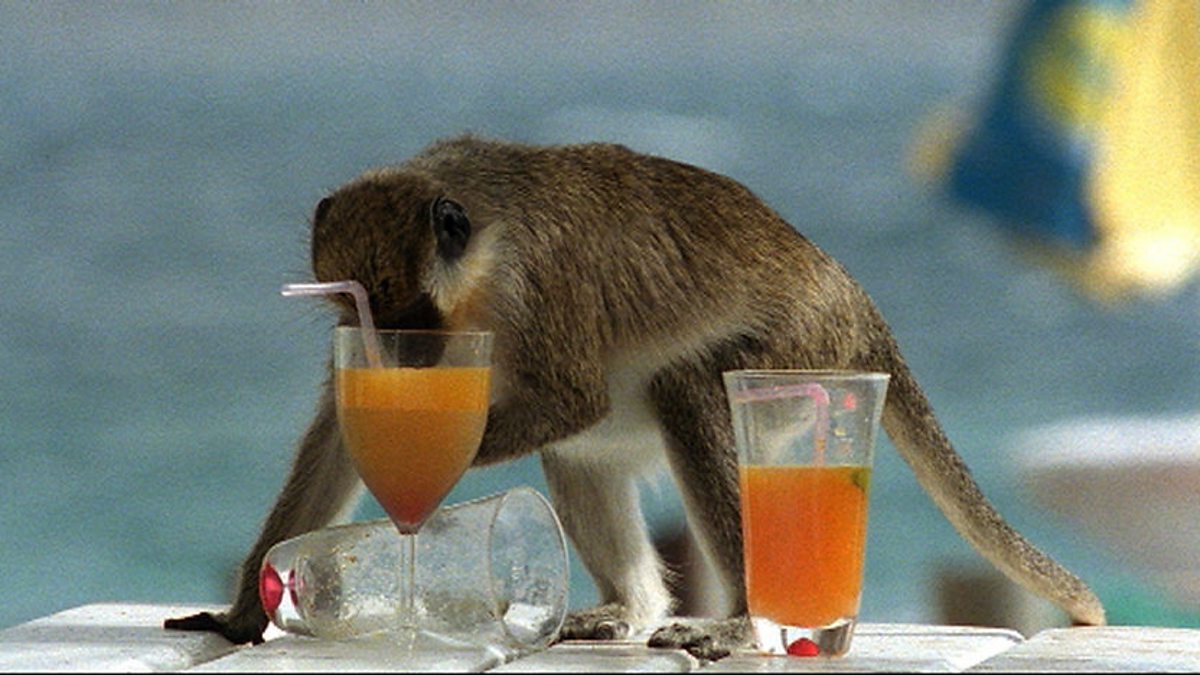
Ever heard of monkeys that love a good drink? Drunk monkeys in St. Kitts are a real thing! These cheeky primates have developed a taste for alcohol, often swiping cocktails from unsuspecting tourists. Found on the Caribbean island of St. Kitts, these vervet monkeys have become quite the local celebrities. They’re known for their mischievous antics, especially around beach bars and resorts. How did they develop this unusual habit? It’s believed they inherited it from their ancestors, who consumed fermented sugar cane left by rum producers. Ready to learn more about these boozy primates? Let’s dive into 35 fascinating facts about them!
Key Takeaways:
- Drunk monkeys in St. Kitts love alcohol and have influenced local culture and tourism. They can be playful, aggressive, and even make poor decisions when intoxicated.
- Efforts are being made to manage the situation and protect the monkeys. Conservationists are working to find alternative food sources and ensure the well-being of these unique primates.
The Unique Phenomenon of Drunk Monkeys in St. Kitts
St. Kitts, a beautiful island in the Caribbean, is home to a unique and fascinating phenomenon: drunk monkeys. These monkeys have developed a taste for alcohol, leading to some interesting behaviors and stories. Let's dive into some intriguing facts about these tipsy primates.
How It All Began
The story of drunk monkeys in St. Kitts starts with a bit of history and evolution.
-
Monkeys were brought to St. Kitts by French settlers in the 17th century. They were originally from Africa and were brought over as pets.
-
The monkeys are Vervet monkeys, known for their adaptability. This adaptability has allowed them to thrive on the island.
-
Vervet monkeys have a natural inclination towards sweet foods. This preference led them to discover fermented sugar cane left out by locals.
-
Fermented sugar cane produces alcohol. The monkeys quickly developed a taste for it, leading to their drunken escapades.
The Monkeys' Drinking Habits
Understanding the drinking habits of these monkeys can shed light on their behavior and interactions with humans.
-
Monkeys prefer alcohol over water when given a choice. This preference has been observed in various studies.
-
They have different drinking styles. Some monkeys sip slowly, while others gulp down large amounts quickly.
-
Young monkeys learn to drink by observing older ones. This behavior is similar to how human children learn from adults.
-
Monkeys have been seen stealing alcoholic drinks from tourists. Their boldness often surprises visitors.
-
They show signs of addiction. Some monkeys exhibit withdrawal symptoms when they don't get their regular fix.
Impact on Local Culture and Tourism
The presence of these drunk monkeys has had a significant impact on the local culture and tourism industry in St. Kitts.
-
Drunk monkeys have become a tourist attraction. Many visitors come to the island hoping to catch a glimpse of these inebriated primates.
-
Local businesses have capitalized on the phenomenon. Some bars and restaurants use the monkeys as a marketing tool.
-
There are even monkey-themed souvenirs. Tourists can buy items like T-shirts and mugs featuring the famous drunk monkeys.
-
The monkeys have influenced local folklore. Stories about their antics are passed down through generations.
Scientific Studies and Observations
Researchers have taken a keen interest in studying the behavior of these alcohol-loving monkeys.
-
Studies have shown that monkeys have similar drinking patterns to humans. This includes social drinking and solitary drinking.
-
Research has been conducted on their tolerance levels. Some monkeys can handle more alcohol than others, just like humans.
-
Scientists have used these monkeys to study alcoholism. Their behavior provides insights into human addiction.
-
Monkeys have been observed using alcohol to cope with stress. This behavior mirrors how some humans use alcohol.
-
There are ethical considerations in studying these monkeys. Researchers must ensure that their studies do not harm the animals.
The Monkeys' Behavior When Drunk
Drunk monkeys exhibit a range of behaviors that can be both amusing and concerning.
-
Drunk monkeys can become aggressive. They may fight with each other or even attack humans.
-
Some monkeys become very playful. They engage in more social interactions and play games with each other.
-
Others become lethargic. They may lie down and sleep off their drunkenness.
-
Monkeys have been seen stumbling and falling. Their coordination is affected by alcohol, just like in humans.
-
They sometimes make poor decisions. This can include wandering into dangerous areas or approaching predators.
Efforts to Manage the Situation
Local authorities and organizations have taken steps to manage the situation and ensure the safety of both monkeys and humans.
-
There are programs to educate tourists. Visitors are informed about the monkeys and advised not to feed them alcohol.
-
Some areas have been designated as monkey-free zones. This helps to reduce conflicts between monkeys and humans.
-
Efforts are being made to reduce the availability of alcohol. This includes securing trash bins and limiting outdoor storage of fermented foods.
-
There are discussions about creating a sanctuary. A safe space for the monkeys where they can live without access to alcohol.
Interesting Anecdotes and Stories
The drunk monkeys of St. Kitts have inspired many interesting anecdotes and stories over the years.
-
A monkey once stole a cocktail from a beach bar. The incident was caught on camera and went viral online.
-
There are tales of monkeys crashing parties. They have been known to join in on celebrations and help themselves to drinks.
-
Some monkeys have become local celebrities. They are recognized by locals and tourists alike.
-
There are stories of monkeys hitching rides on boats. They travel to different parts of the island in search of alcohol.
-
Monkeys have been seen mimicking drunk humans. Their behavior can be eerily similar to that of intoxicated people.
The Future of Drunk Monkeys in St. Kitts
The future of these monkeys is uncertain, but efforts are being made to ensure their well-being.
-
Conservationists are working to protect the monkeys. They aim to balance the needs of the monkeys with those of the local community.
-
There is ongoing research into alternative food sources. Providing the monkeys with non-alcoholic options could help reduce their dependence on alcohol.
-
The phenomenon continues to intrigue people worldwide. The story of the drunk monkeys of St. Kitts remains a fascinating topic of discussion.
The Final Sip
Drunk monkeys in St. Kitts offer a fascinating glimpse into animal behavior and human impact. These monkeys, originally brought by settlers, adapted to their new environment in unexpected ways. Their love for alcohol, often sourced from tourists' drinks, highlights how animals can develop unusual habits due to human influence.
Understanding these monkeys' behavior helps us see the broader picture of wildlife adaptation. It also reminds us of our responsibility in preserving natural habitats and respecting wildlife. Next time you visit St. Kitts, keep an eye out for these cheeky primates. They’re not just a quirky tourist attraction but a testament to nature's adaptability.
So, whether you're a wildlife enthusiast or just curious, the story of St. Kitts' drunk monkeys is a reminder of the surprising ways animals and humans intersect. Cheers to learning something new!
Frequently Asked Questions
Was this page helpful?
Our commitment to delivering trustworthy and engaging content is at the heart of what we do. Each fact on our site is contributed by real users like you, bringing a wealth of diverse insights and information. To ensure the highest standards of accuracy and reliability, our dedicated editors meticulously review each submission. This process guarantees that the facts we share are not only fascinating but also credible. Trust in our commitment to quality and authenticity as you explore and learn with us.


